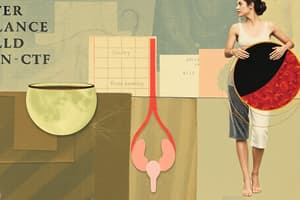Podcast
Questions and Answers
What is the primary method of water movement into and out of body fluid compartments?
What is the primary method of water movement into and out of body fluid compartments?
- Filtration
- Active transport
- Osmosis (correct)
- Diffusion
What percentage of total body water is found in intracellular fluid?
What percentage of total body water is found in intracellular fluid?
- 63% (correct)
- 40%
- 75%
- 52%
Which substance primarily regulates water intake in the body?
Which substance primarily regulates water intake in the body?
- Thirst (correct)
- Electrolytes
- Renin
- Osmoreceptors
What triggers the production of ADH in the body?
What triggers the production of ADH in the body?
Which fluid compartment contains the majority of extracellular water?
Which fluid compartment contains the majority of extracellular water?
What is a common cause of dehydration in the body?
What is a common cause of dehydration in the body?
Which hormone stimulates sodium and water reabsorption in the kidneys?
Which hormone stimulates sodium and water reabsorption in the kidneys?
Where does the majority of protein synthesis occur in body compartments?
Where does the majority of protein synthesis occur in body compartments?
Flashcards are hidden until you start studying
Study Notes
Water Balance
- Water movement in the body is primarily regulated by osmosis which is the movement of water molecules through a semi-permeable membrane from an area of high water concentration to low water concentration.
- Concentration of solutes in body fluids determines the direction of water movement.
- Osmoreceptors in the hypothalamus detect changes in blood osmotic pressure (concentration of solutes in the blood), triggering thirst.
- Electrolytes are inorganic compounds that dissociate into ions in solution, playing a crucial role in body fluid balance.
- "Where sodium goes, water follows" highlights the strong influence of sodium on water distribution.
Body Water Content
- The average adult human body contains 40 liters of water, approximately 10.56 gallons.
- Body water content varies by age and gender: babies have the highest proportion (75%), men have around 63%, and women 52%.
Fluid Compartments
- Body fluids are divided into intracellular and extracellular compartments separated by selectively permeable membranes.
- Intracellular fluid makes up 2/3 (63%) of the total body water and is found within cells.
- Extracellular fluid constitutes 1/3 (37%) of total body water and is divided into interstitial fluid (80%) and blood plasma (20%).
Composition of Body Fluids
- Extracellular fluids are characterized by high concentrations of sodium (Na+), chloride (Cl-), calcium (Ca++), and bicarbonate (HCO3-).
- Blood plasma contains higher protein levels compared to interstitial fluid and lymph.
- Intracellular fluids have high concentrations of potassium (K+), phosphate, magnesium (Mg++), and more protein than plasma.
Regulation of Water Intake
- Thirst is the primary mechanism for regulating water intake.
- Even a 1% decrease in body water triggers dehydration, resulting in:
- Reduced saliva production
- Increased blood osmotic pressure, stimulating osmoreceptors in the hypothalamus
- Decreased blood volume leading to the release of renin
Regulation of Water Output
- Water output is primarily regulated through urine formation by the kidneys.
- Antidiuretic hormone (ADH) is released in response to increased blood tonicity or decreased blood volume.
- ADH acts on the distal convoluted tubules and collecting ducts of the kidneys, increasing water reabsorption.
- Aldosterone, stimulated by angiotensin II (produced due to renin release), promotes sodium (and water) reabsorption in the kidneys.
- Atrial natriuretic peptide (ANP) is released when pressure in the right atrium is too high, causing sodium (and water) loss.
Water Imbalances
- Dehydration is the most common water imbalance, occurring due to:
- Prolonged diarrhea or vomiting
- Excessive sweating
Studying That Suits You
Use AI to generate personalized quizzes and flashcards to suit your learning preferences.


